Founded in 1938 and published semiannually by Sophia University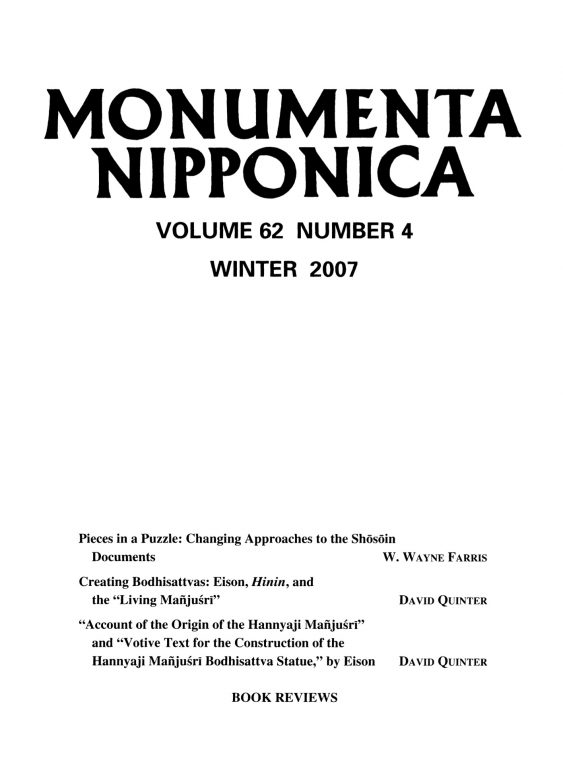 MN 62:4 (2007) 397–435Pieces in a Puzzle: Changing Approaches to the Shōsōin DocumentsWilliam Wayne Farris
MN 62:4 (2007) 397–435Pieces in a Puzzle: Changing Approaches to the Shōsōin DocumentsWilliam Wayne Farris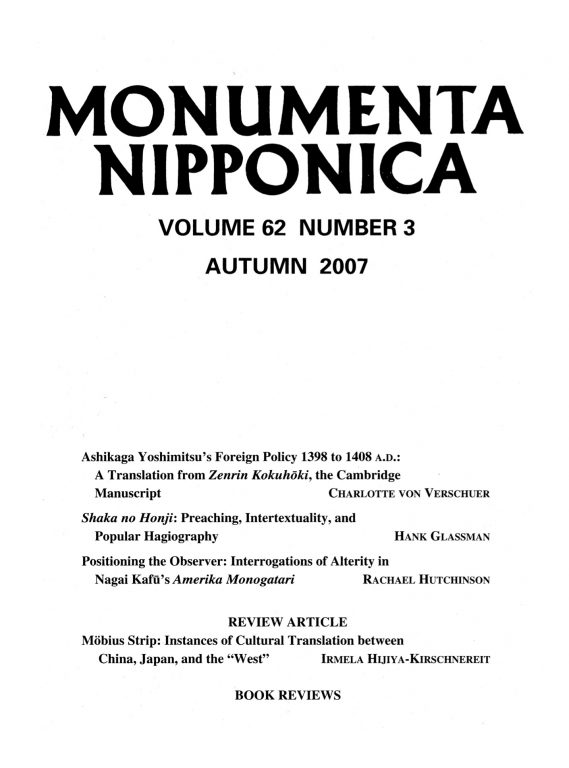 MN 62:3 (2007) 279–97Zenrin Kokuhōki (Part 3)Zuikei Shūhō, Translated by Charlotte von Verschuer
MN 62:3 (2007) 279–97Zenrin Kokuhōki (Part 3)Zuikei Shūhō, Translated by Charlotte von Verschuer MN 62:3 (2007) 261–97Ashikaga Yoshimitsu’s Foreign Policy 1398 to 1408 A.D.: A Translation from Zenrin Kokuhōki, the Cambridge ManuscriptCharlotte von Verschuer
MN 62:3 (2007) 261–97Ashikaga Yoshimitsu’s Foreign Policy 1398 to 1408 A.D.: A Translation from Zenrin Kokuhōki, the Cambridge ManuscriptCharlotte von Verschuer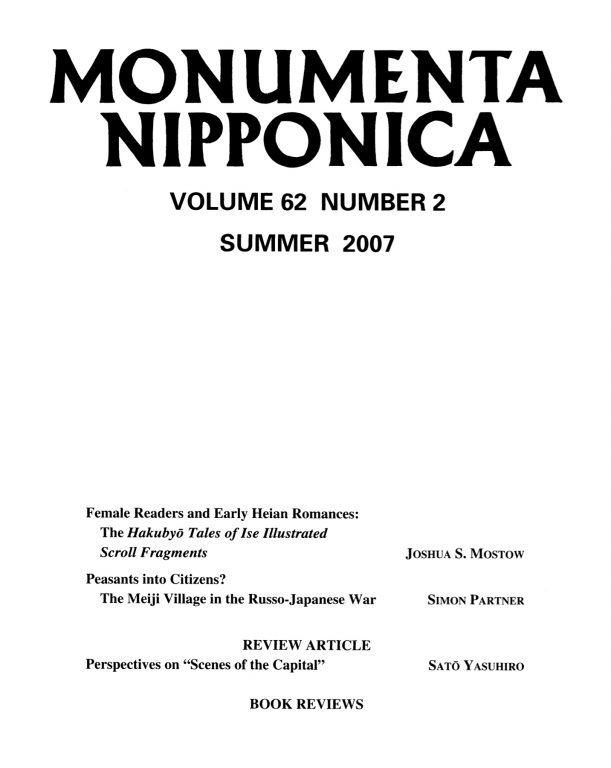 MN 62:2 (2007) 179–209Peasants into Citizens?: The Meiji Village in the Russo-Japanese WarSimon Partner
MN 62:2 (2007) 179–209Peasants into Citizens?: The Meiji Village in the Russo-Japanese WarSimon Partner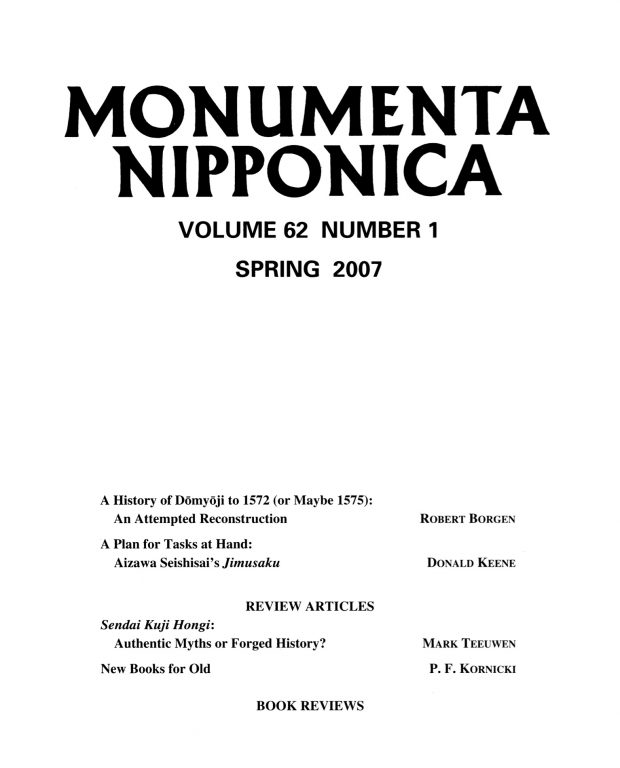 MN 62:1 (2007) 80–86A Plan for Tasks at HandAizawa Seishisai, Translated by Donald Keene
MN 62:1 (2007) 80–86A Plan for Tasks at HandAizawa Seishisai, Translated by Donald Keene MN 62:1 (2007) 97–105New Books for OldPeter F. Kornicki
MN 62:1 (2007) 97–105New Books for OldPeter F. Kornicki MN 62:1 (2007) 119–21Gendering Modern Japanese History ed. Barbara Moloney, Kathleen UnoAnne E. Imamura
MN 62:1 (2007) 119–21Gendering Modern Japanese History ed. Barbara Moloney, Kathleen UnoAnne E. Imamura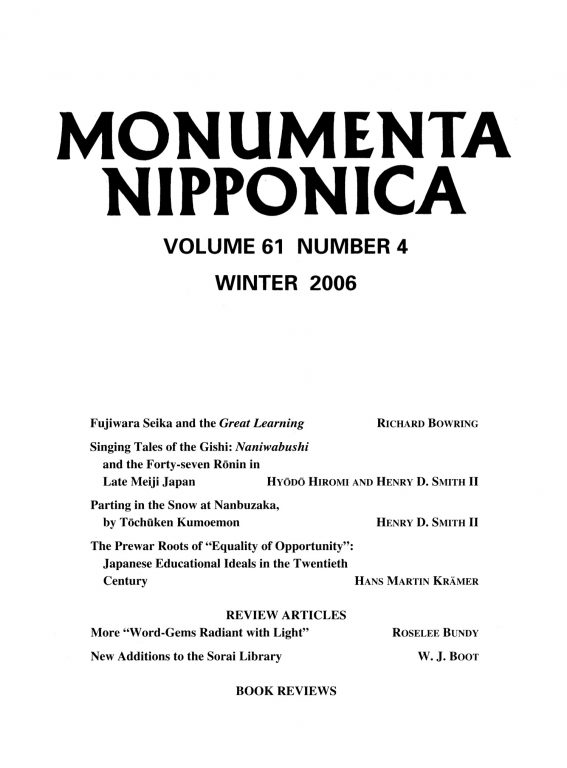 MN 61:4 (2006) 521–549The Prewar Roots of “Equality of Opportunity”: Japanese Educational Ideals in the Twentieth CenturyHans Martin Krämer
MN 61:4 (2006) 521–549The Prewar Roots of “Equality of Opportunity”: Japanese Educational Ideals in the Twentieth CenturyHans Martin Krämer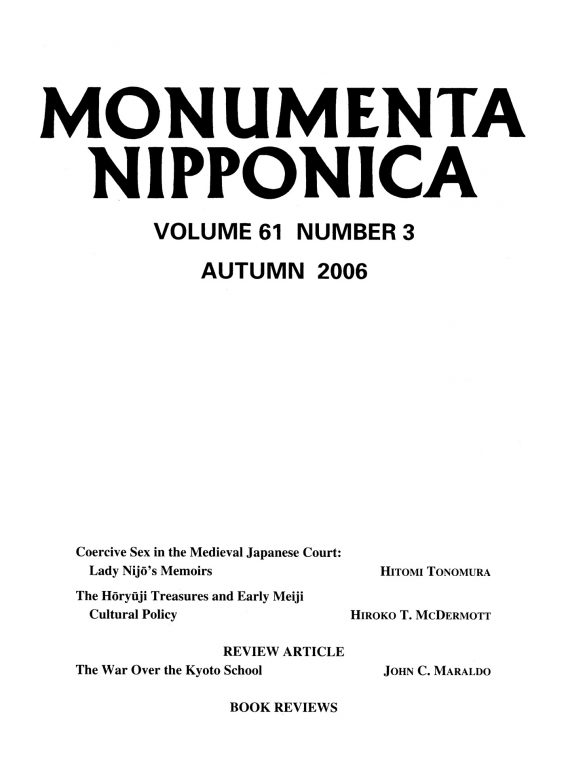 MN 61:3 (2006) 375–406The War Over the Kyoto SchoolJohn C. Maraldo
MN 61:3 (2006) 375–406The War Over the Kyoto SchoolJohn C. Maraldo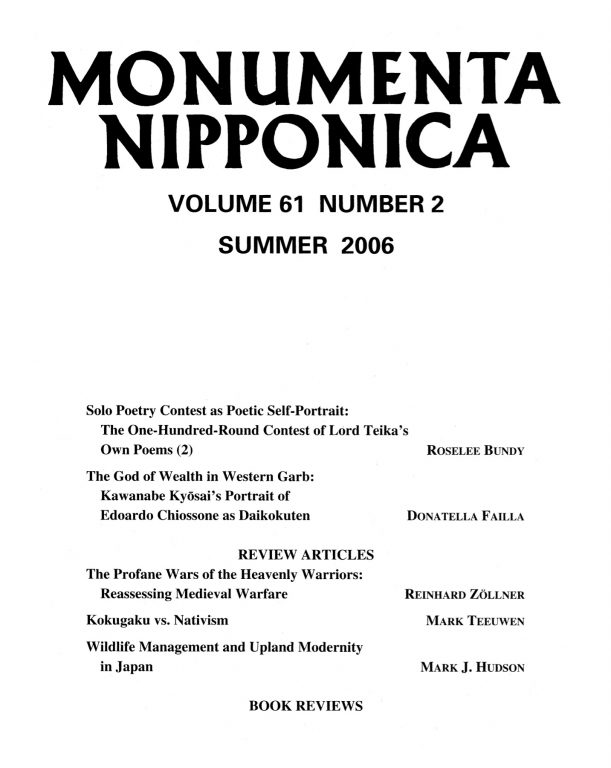 MN 61:2 (2006) 193–218The God of Wealth in Western Garb: Kawanabe Kyōsai’s Portrait of Edoardo Chiossone as DaikokutenDonatella Failla
MN 61:2 (2006) 193–218The God of Wealth in Western Garb: Kawanabe Kyōsai’s Portrait of Edoardo Chiossone as DaikokutenDonatella Failla MN 61:2 (2006) 219–26The Profane Wars of the Heavenly Warriors: Reassessing Medieval WarfareReinhard Zöllner
MN 61:2 (2006) 219–26The Profane Wars of the Heavenly Warriors: Reassessing Medieval WarfareReinhard Zöllner MN 61:2 (2006) 227–42Kokugaku vs. NativismMark Teeuwen
MN 61:2 (2006) 227–42Kokugaku vs. NativismMark Teeuwen MN 61:2 (2006) 243–49Wildlife Management and Upland Modernity in JapanMark J. Hudson
MN 61:2 (2006) 243–49Wildlife Management and Upland Modernity in JapanMark J. Hudson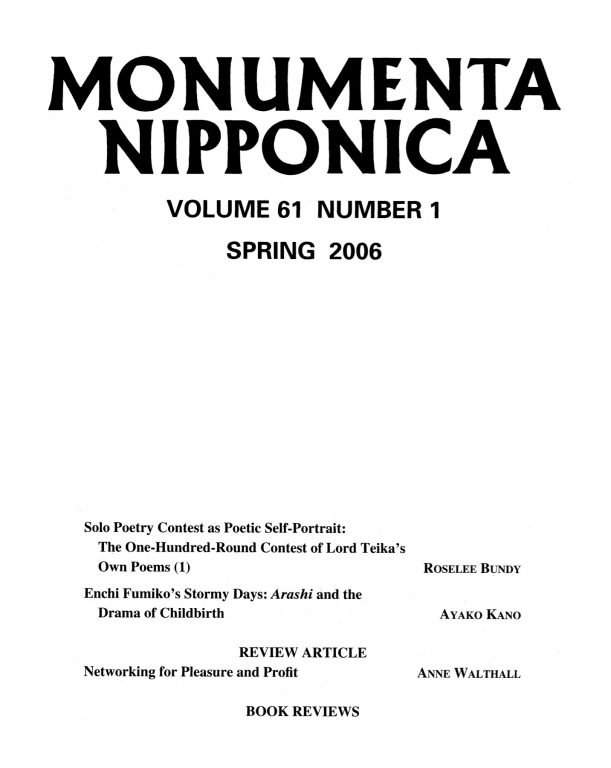 MN 61:1 (2006) 93–103Networking for Pleasure and ProfitAnne Walthall
MN 61:1 (2006) 93–103Networking for Pleasure and ProfitAnne Walthall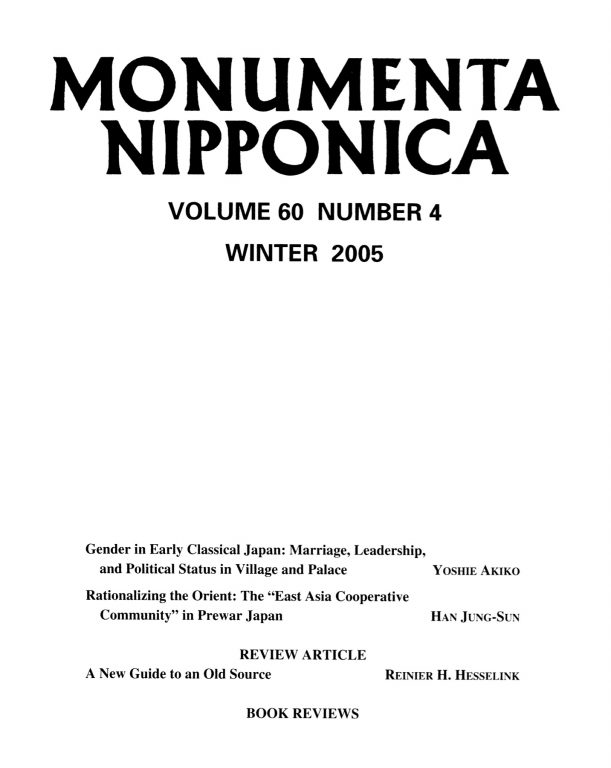 MN 60:4 (2005) 481–514Rationalizing the Orient: The “East Asia Cooperative Community” in Prewar JapanJung-Sun Han
MN 60:4 (2005) 481–514Rationalizing the Orient: The “East Asia Cooperative Community” in Prewar JapanJung-Sun Han MN 60:4 (2005) 515–523A New Guide to an Old SourceReinier H. Hesselink
MN 60:4 (2005) 515–523A New Guide to an Old SourceReinier H. Hesselink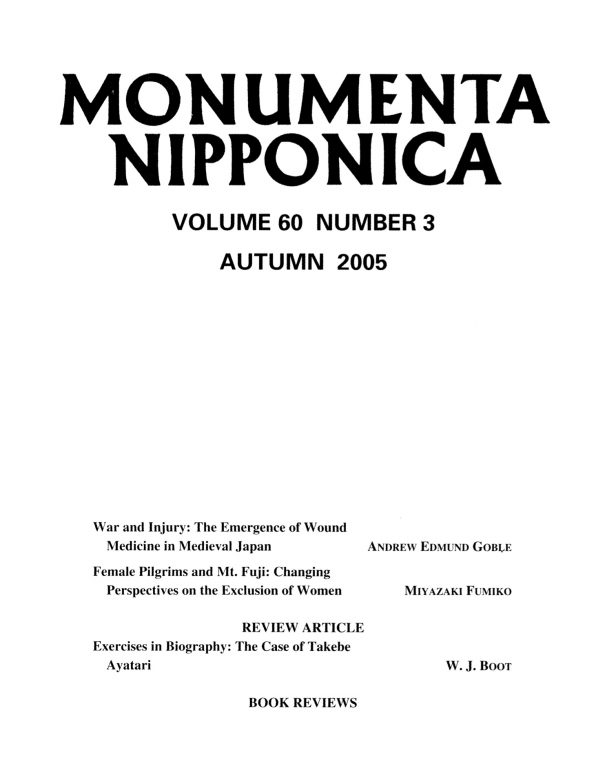 MN 60:3 (2005) 297–338War and Injury: The Emergence of Wound Medicine in Medieval JapanAndrew Edmund Goble
MN 60:3 (2005) 297–338War and Injury: The Emergence of Wound Medicine in Medieval JapanAndrew Edmund Goble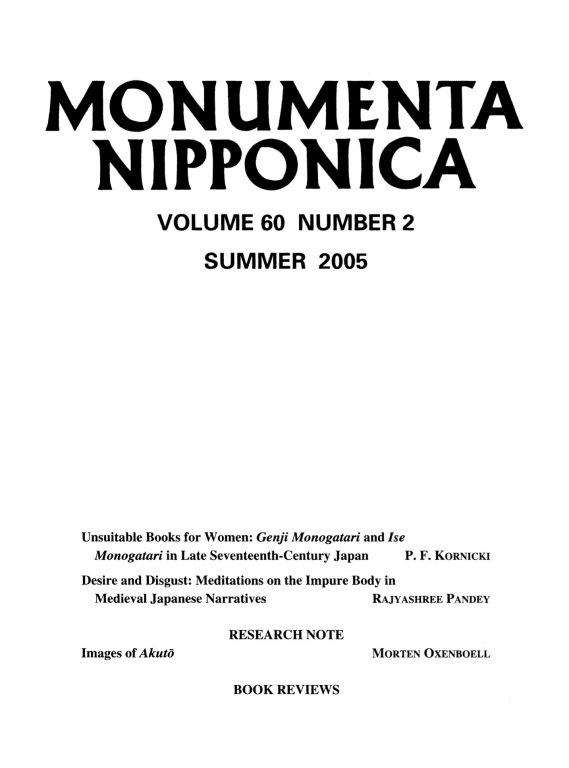 MN 60:2 (2005) 235–62Images of AkutōMorten Oxenboell
MN 60:2 (2005) 235–62Images of AkutōMorten Oxenboell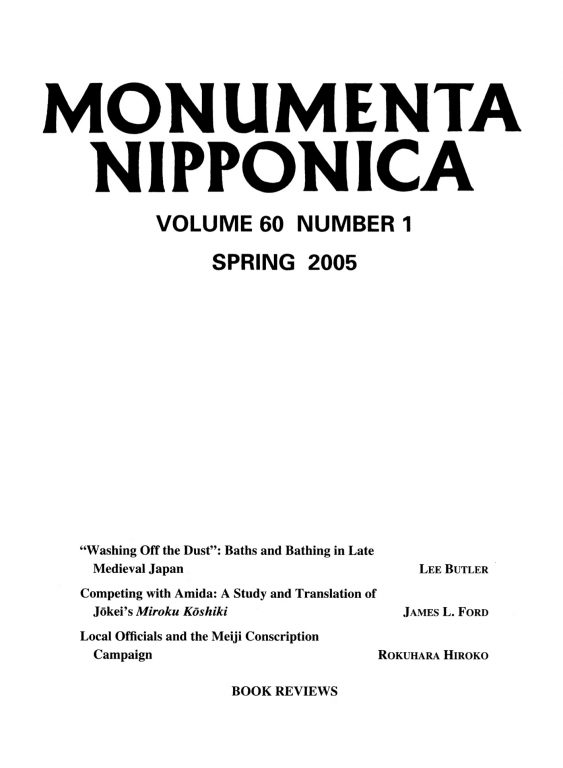 MN 60:1 (2005) 1–41“Washing Off the Dust”: Baths and Bathing in Late Medieval JapanLee A. Butler
MN 60:1 (2005) 1–41“Washing Off the Dust”: Baths and Bathing in Late Medieval JapanLee A. Butler MN 60:1 (2005) 81–110Local Officials and the Meiji Conscription CampaignHiroko Rokuhara
MN 60:1 (2005) 81–110Local Officials and the Meiji Conscription CampaignHiroko Rokuhara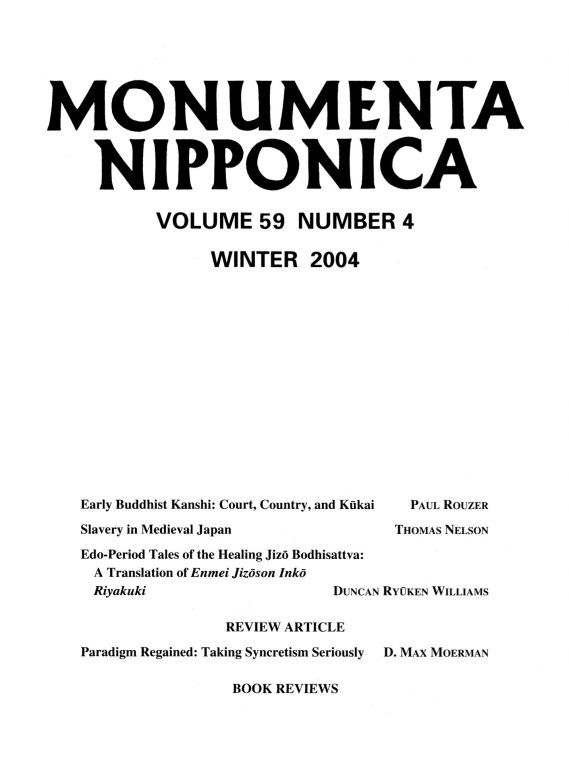 MN 59:4 (2004) 463–92Slavery in Medieval JapanThomas Nelson
MN 59:4 (2004) 463–92Slavery in Medieval JapanThomas Nelson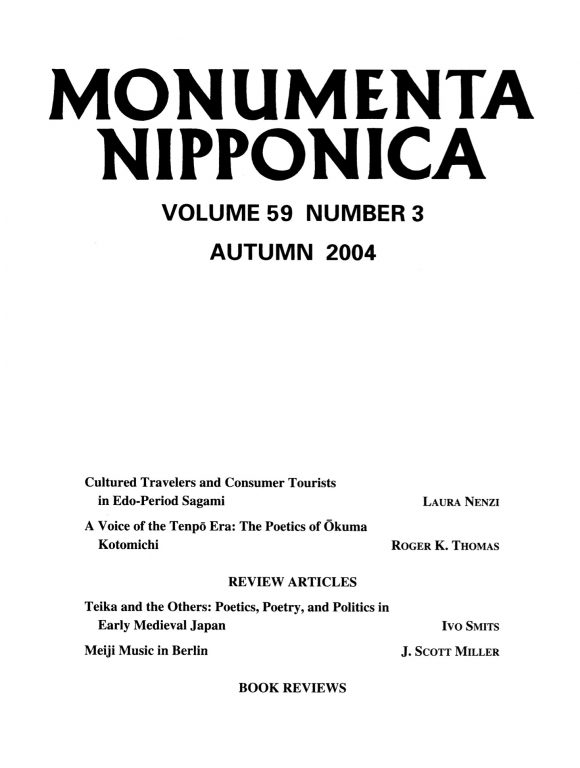 MN 59:3 (2004) 285–319Cultured Travelers and Consumer Tourists in Edo-Period SagamiLaura Nenzi
MN 59:3 (2004) 285–319Cultured Travelers and Consumer Tourists in Edo-Period SagamiLaura Nenzi MN 59:3 (2004) 391–94Meiji Music in BerlinJ. Scott Miller
MN 59:3 (2004) 391–94Meiji Music in BerlinJ. Scott Miller MN 59:3 (2004) 430Comment: The Iwakura Embassy in RussiaPeter F. Kornicki
MN 59:3 (2004) 430Comment: The Iwakura Embassy in RussiaPeter F. Kornicki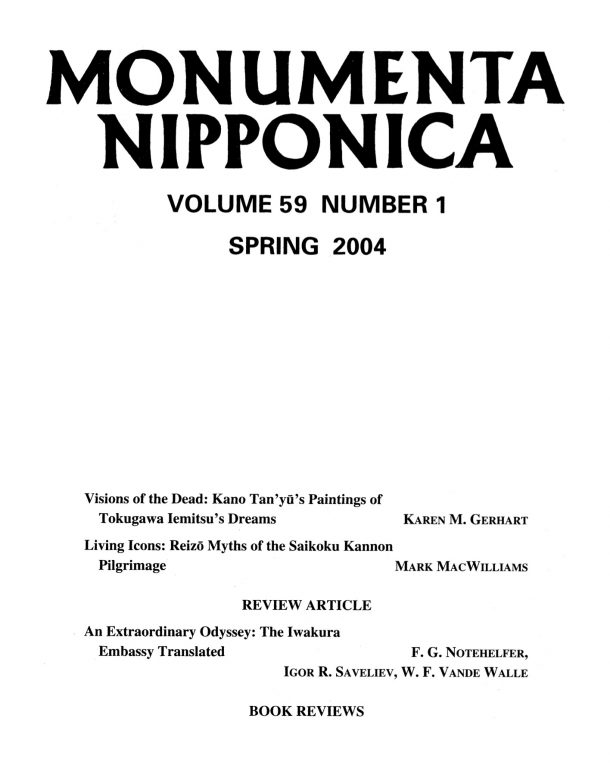 MN 59:1 (2004) 83–119An Extraordinary Odyssey: The Iwakura Embassy TranslatedF. G. Notehelfer, Igor R. Saveliev and W. F. Vande Walle
MN 59:1 (2004) 83–119An Extraordinary Odyssey: The Iwakura Embassy TranslatedF. G. Notehelfer, Igor R. Saveliev and W. F. Vande Walle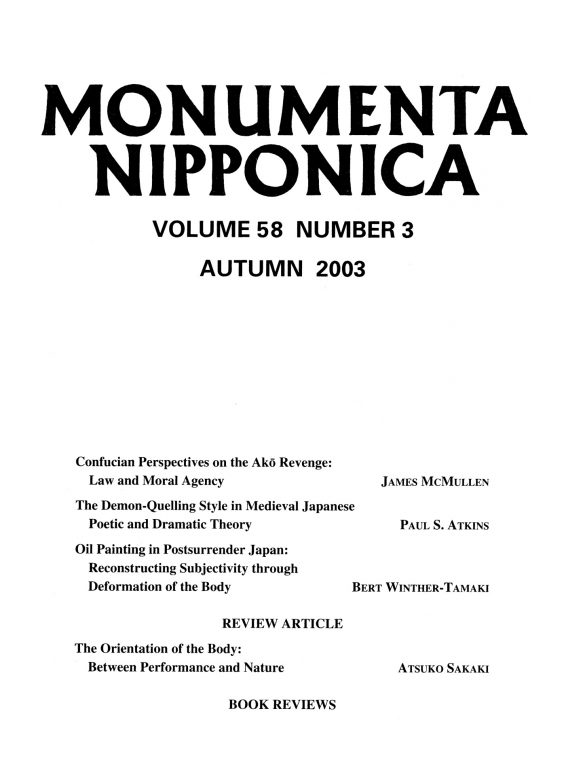 MN 58:3 (2003) 293–315Confucian Perspectives on the Akō Revenge: Law and Moral AgencyJames McMullen
MN 58:3 (2003) 293–315Confucian Perspectives on the Akō Revenge: Law and Moral AgencyJames McMullen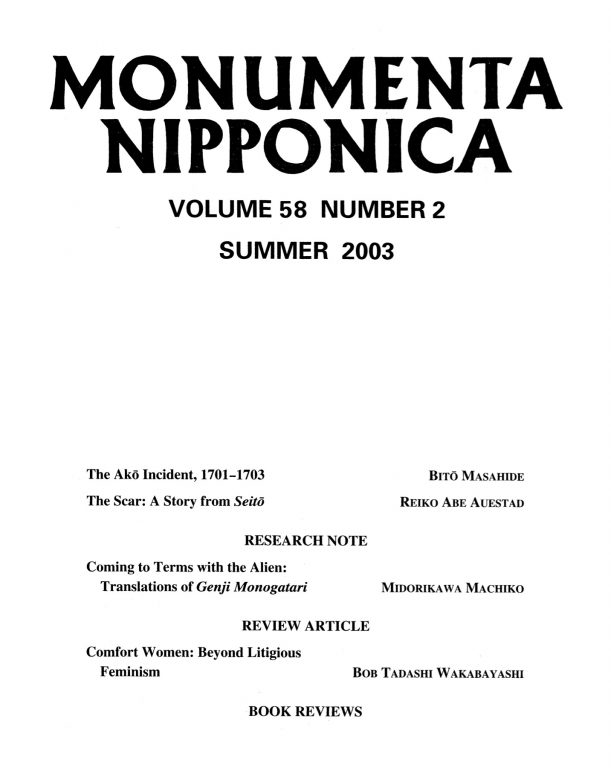 MN 58:2 (2003) 149–70The Akō Incident, 1701–1703Masahide Bitō, Translated by Henry D. Smith II
MN 58:2 (2003) 149–70The Akō Incident, 1701–1703Masahide Bitō, Translated by Henry D. Smith II MN 58:2 (2003) 223–58Comfort Women: Beyond Litigious FeminismBob Tadashi Wakabayashi
MN 58:2 (2003) 223–58Comfort Women: Beyond Litigious FeminismBob Tadashi Wakabayashi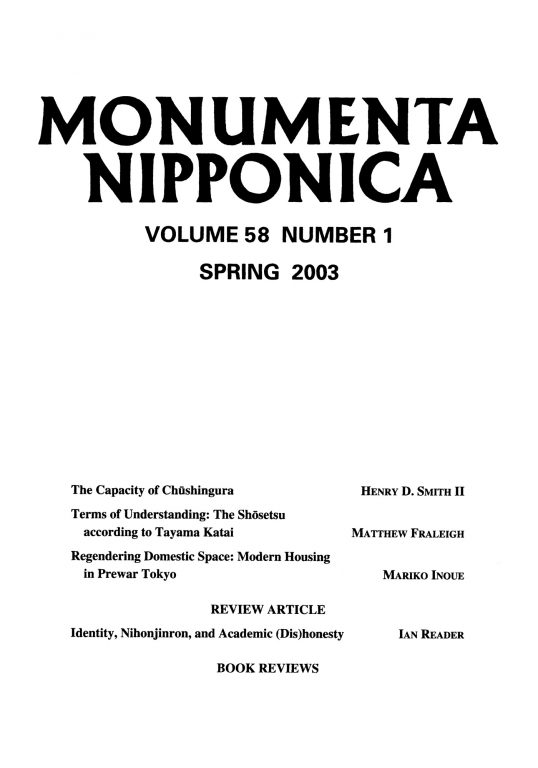 MN 58:1 (2003) 1–42The Capacity of Chūshingura: Three Hundred Years of ChūshinguraHenry D. Smith II
MN 58:1 (2003) 1–42The Capacity of Chūshingura: Three Hundred Years of ChūshinguraHenry D. Smith II MN 58:1 (2003) 103–16Identity, Nihonjinron, and Academic (Dis) honestyIan Reader
MN 58:1 (2003) 103–16Identity, Nihonjinron, and Academic (Dis) honestyIan Reader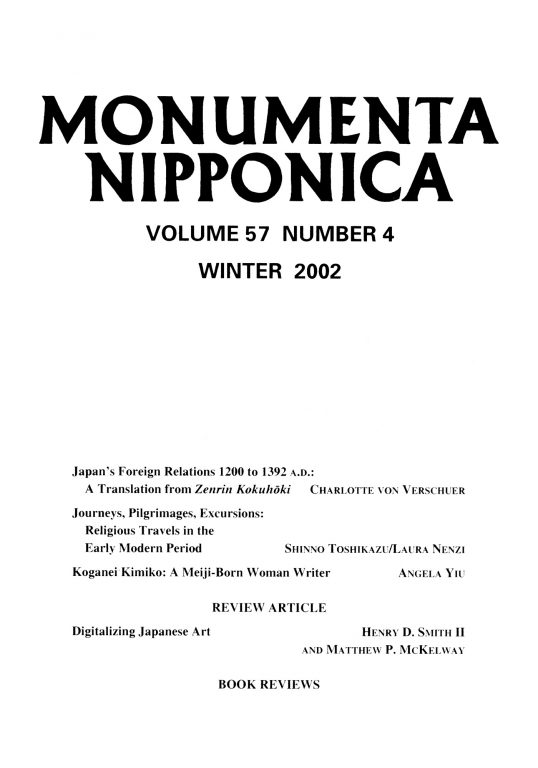 MN 57:4 (2002) 423–45Zenrin kokuhōki (Part 2)Zuikei Shūhō, Translated by Charlotte von Verschuer
MN 57:4 (2002) 423–45Zenrin kokuhōki (Part 2)Zuikei Shūhō, Translated by Charlotte von Verschuer MN 57:4 (2002) 413–45Japan’s Foreign Relations 1200 to 1392 A.D.: A Translation from “Zenrin Kokuhōki”Charlotte von Verschuer
MN 57:4 (2002) 413–45Japan’s Foreign Relations 1200 to 1392 A.D.: A Translation from “Zenrin Kokuhōki”Charlotte von Verschuer MN 57:4 (2002) 447–71Journeys, Pilgrimages, Excursions: Religious Travels in the Early Modern PeriodLaura Nenzi and Toshikazu Shinno
MN 57:4 (2002) 447–71Journeys, Pilgrimages, Excursions: Religious Travels in the Early Modern PeriodLaura Nenzi and Toshikazu Shinno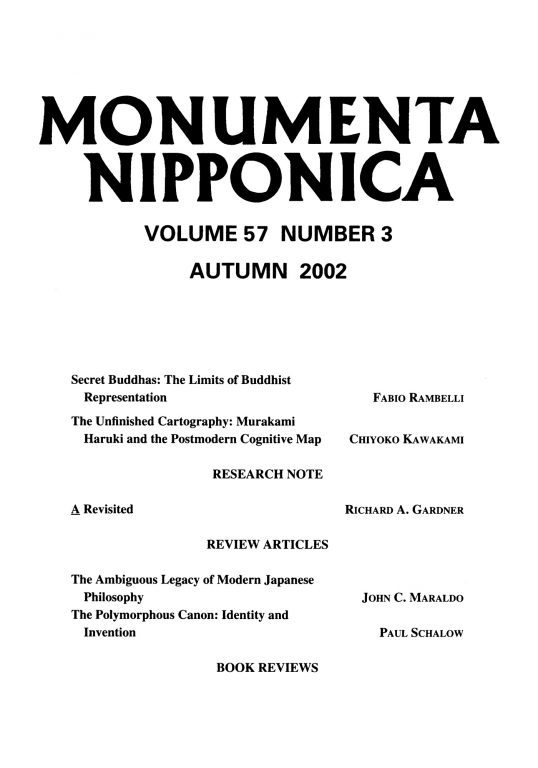 MN 57:3 (2002) 359–72The Polymorphous Canon: Identity and InventionPaul Gordon Schalow
MN 57:3 (2002) 359–72The Polymorphous Canon: Identity and InventionPaul Gordon Schalow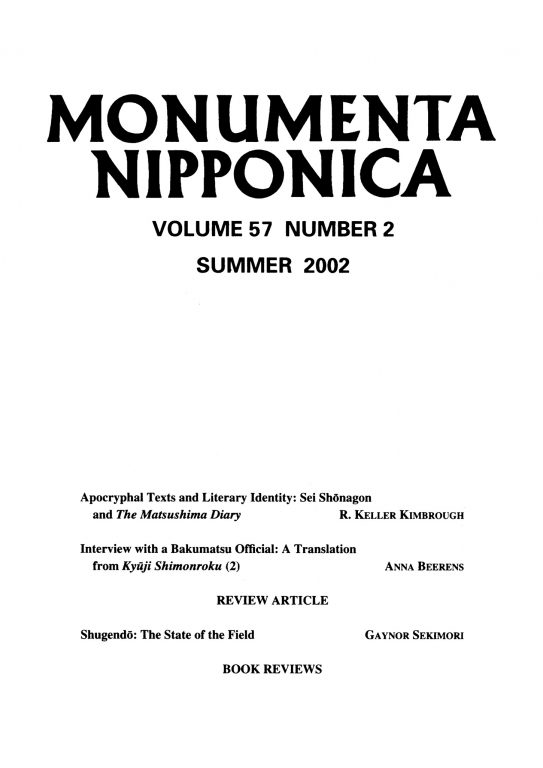 MN 57:2 (2002) 173–206Interview with a Bakumatsu Official: A Translation from “Kyūji Shimonroku” (Part 2)Kyūji Shimonkai and Yamaguchi Naoki, Translated by Anna Beerens
MN 57:2 (2002) 173–206Interview with a Bakumatsu Official: A Translation from “Kyūji Shimonroku” (Part 2)Kyūji Shimonkai and Yamaguchi Naoki, Translated by Anna Beerens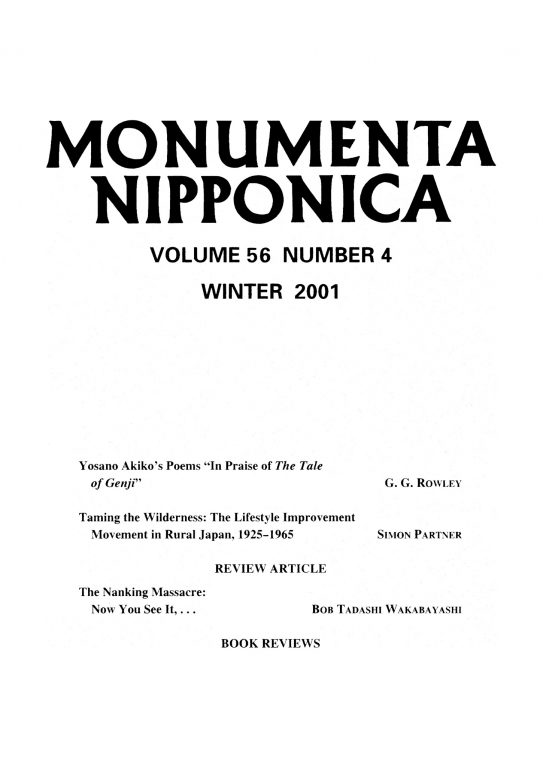 MN 56:4 (2001) 487–520Taming the Wilderness: The Lifestyle Improvement Movement in Rural Japan, 1925–1965Simon Partner
MN 56:4 (2001) 487–520Taming the Wilderness: The Lifestyle Improvement Movement in Rural Japan, 1925–1965Simon Partner MN 56:4 (2001) 521–544The Nanking Massacre: Now You See It, . . .Bob Tadashi Wakabayashi
MN 56:4 (2001) 521–544The Nanking Massacre: Now You See It, . . .Bob Tadashi Wakabayashi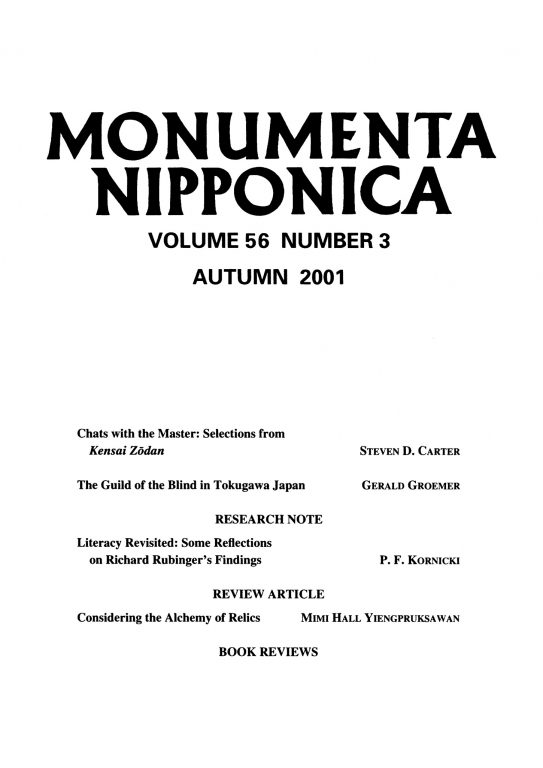 MN 56:3 (2001) 349–80The Guild of the Blind in Tokugawa JapanGerald Groemer
MN 56:3 (2001) 349–80The Guild of the Blind in Tokugawa JapanGerald Groemer MN 56:3 (2001) 381–95Literacy Revisited: Some Reflections on Richard Rubinger’s FindingsPeter F. Kornicki
MN 56:3 (2001) 381–95Literacy Revisited: Some Reflections on Richard Rubinger’s FindingsPeter F. Kornicki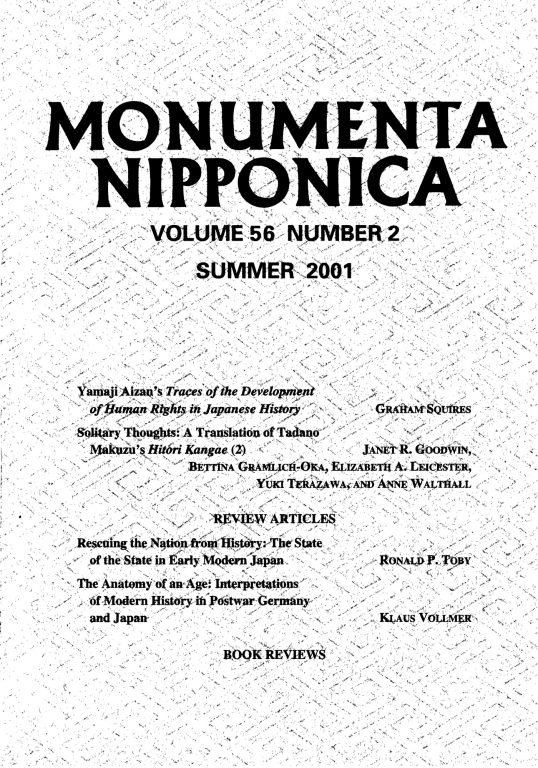 MN 56:2 (2001) 151–71Traces of the Development of Human Rights in Japanese HistoryYamaji Aizan, Translated by Graham Squires
MN 56:2 (2001) 151–71Traces of the Development of Human Rights in Japanese HistoryYamaji Aizan, Translated by Graham Squires MN 56:2 (2001) 139–71Yamaji Aizan’s Traces of the Development of Human Rights in Japanese HistoryGraham Squires
MN 56:2 (2001) 139–71Yamaji Aizan’s Traces of the Development of Human Rights in Japanese HistoryGraham Squires MN 56:2 (2001) 173–95Solitary Thoughts: A Translation of Tadano Makuzu’s Hitori Kangae (Part 2)Tadano Makuzu, Translated by Janet R. Goodwin, Bettina Gramlich-Oka, Elizabeth A. Leicester, Yuki Terazawa and Anne Walthall
MN 56:2 (2001) 173–95Solitary Thoughts: A Translation of Tadano Makuzu’s Hitori Kangae (Part 2)Tadano Makuzu, Translated by Janet R. Goodwin, Bettina Gramlich-Oka, Elizabeth A. Leicester, Yuki Terazawa and Anne Walthall MN 56:2 (2001) 197–237Rescuing the Nation from History: The State of the State in Early Modern JapanRonald P. Toby
MN 56:2 (2001) 197–237Rescuing the Nation from History: The State of the State in Early Modern JapanRonald P. Toby MN 56:2 (2001) 239–54The Anatomy of an Age: Interpretations of Modern History in Postwar Germany and JapanKlaus Vollmer
MN 56:2 (2001) 239–54The Anatomy of an Age: Interpretations of Modern History in Postwar Germany and JapanKlaus Vollmer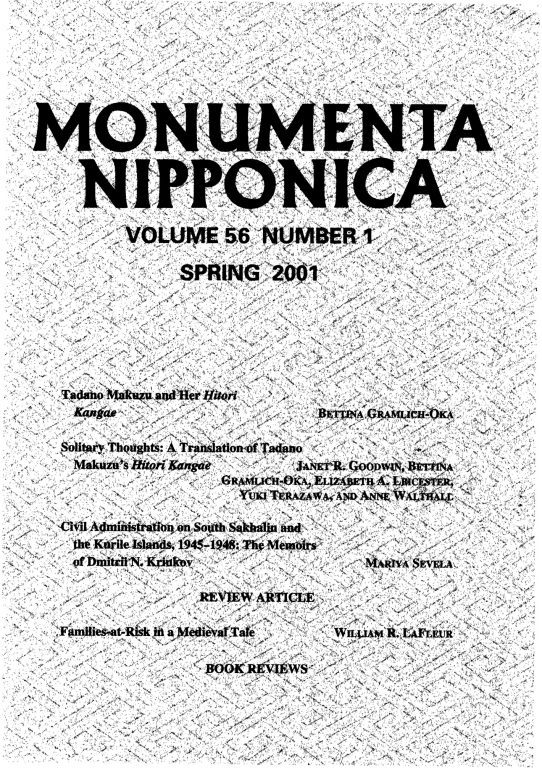 MN 56:1 (2001) 21–38Solitary Thoughts: A Translation of Tadano Makuzu’s Hitori Kangae (Part 1)Tadano Makuzu, Translated by Janet R. Goodwin, Bettina Gramlich-Oka, Elizabeth A. Leicester, Yuki Terazawa and Anne Walthall
MN 56:1 (2001) 21–38Solitary Thoughts: A Translation of Tadano Makuzu’s Hitori Kangae (Part 1)Tadano Makuzu, Translated by Janet R. Goodwin, Bettina Gramlich-Oka, Elizabeth A. Leicester, Yuki Terazawa and Anne Walthall MN 56:1 (2001) 1–38Tadano Makuzu and Her Hitori KangaeBettina Gramlich-Oka
MN 56:1 (2001) 1–38Tadano Makuzu and Her Hitori KangaeBettina Gramlich-Oka MN 56:1 (2001) 45–91Civil Administration on South Sakhalin and the Kurile Islands, 1945–1948Dmitrii N. Kriukov, Translated by Mariya Sevela
MN 56:1 (2001) 45–91Civil Administration on South Sakhalin and the Kurile Islands, 1945–1948Dmitrii N. Kriukov, Translated by Mariya Sevela MN 56:1 (2001) 39–91Civil Administration on South Sakhalin and the Kurile Islands, 1945–1948: The Memoirs of Dmitrii N. KriukovMariya Sevela
MN 56:1 (2001) 39–91Civil Administration on South Sakhalin and the Kurile Islands, 1945–1948: The Memoirs of Dmitrii N. KriukovMariya Sevela
























